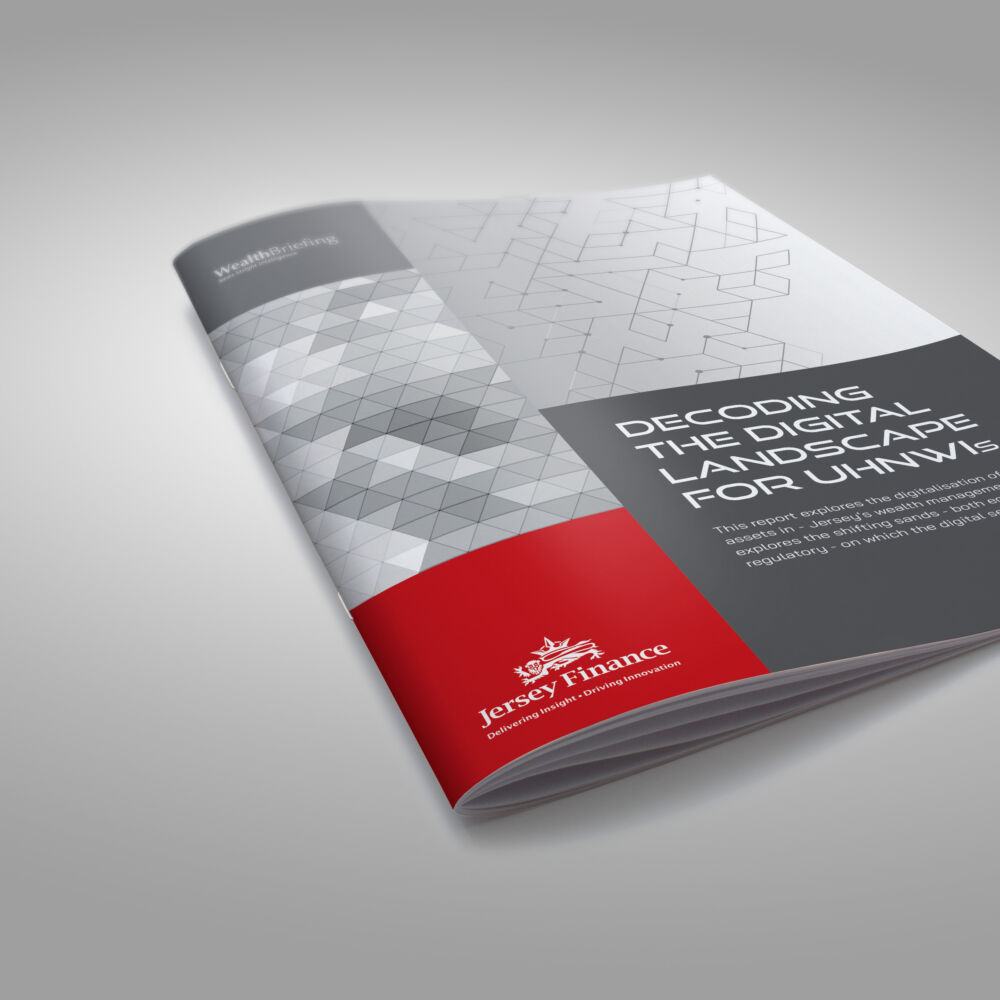Exploring the Digitalisation of Jersey's Wealth Management Sector
The digital landscape is constantly adapting and improving, and we need to ensure that this landscape works for ultra-high-net-worth-individuals (UHNWIs). UHNWIs have a net worth of $30 million plus.
In March 2023, we collaborated with WealthBriefing on a webinar – Decoding The Digital Landscape for UHNWIs. The webinar was moderated by Stephen Harris, WealthBriefing, who was joined by Naomi Rive, Highvern, Heather-Anne Hubbell, Phundex, and James Brockhurst, Forsters, who delved deeper into this topic discussing the benefits and challenges of wealth in digital assets, Jersey’s reputation as an IFC and touched on sustainability and ESG.
Following the webinar, Jersey Finance commissioned Wealthbriefing to produce a report exploring the digitalisation of – and digital assets in – Jersey’s wealth management sector.
Introduction to Decoding the Digital Landscape for UHNWIs
By Chris Hamblin, Editor of ClearView Financial Media, publisher of WealthBriefing:
A recent webinar on the subject of digitalisation and digital assets in Jersey’s wealth management sector explored the shifting sands – both economic and regulatory – on which the digital sector rests. There are many lessons to be learnt from these discussions and all of them are published in this report, along with plenty of insights from trustees, private bankers, wealth managers and experts who constantly provide WealthBriefing with editorial advice.
The digital-asset sector now represents a trillion-dollar alternative asset class. Ultra-high-net-worth (“UHNW”) investors who are looking for International Finance Centres in which to invest their wealth have become very aware of various types of digital asset and some of them have become very enthusiastic, although take-up has been measured. Members of the webinar panel tended to talk about the involvement of high-net-worth-individuals (HNWI) in digital assets in the present tense rather than the future, but this is an area in which many jurisdictions are still treading carefully.
Custody is often a frustration for wealth managers who are brave enough to enter this field, with the recent FTX scandal having tested the trust of many wealthy investors in custodial wallet services to breaking point. The Jersey Financial Services Commission has been very keen to promote blue-chip crypto-projects – a sign that it is being selective in its choice of firms to authorise. This ought to benefit the island in the event of similar circumstances.

A Robust Platform for Digital Assets
Jersey has a very strong regulatory reputation upon which the digital assets industry can draw in its attempts to become established. There is no doubt about the island’s ability to enhance its already robust platform for digital assets. Jersey is stable, both politically and fiscally, which is an important consideration when identifying an appropriate jurisdiction in which to locate your structure. Jersey’s modern and enabling corporate law regimes, partnership regimes and other regimes make it an attractive jurisdiction in which UHNW investors might hold these assets.
“Digital assets are assets in a digital form – like photographs, logos and illustrations. They’ve become very popular new opportunities for investment, in particular because you have the ability to manage the metadata that goes around them. They can be encrypted securely, which makes them a more secure investment… the technology behind crypto-currency is actually the technology that helps to build the digital assets, which makes them secure and safe.” Heather-Anne Hubbell, Phundex.
Artificial Intellligence
The panel discussed the use of Artificial Intelligence (“AI”) in onboarding and other functions as a possibility, although few private bankers and other wealth managers seem to be using it for that purpose at present.
It looked forward to a future in which AI took care of repetitive tasks, freeing up time for relationship managers, trustees and others to concentrate their attention on creating new relationships and enhancing existing ones with their UHNW clients. It also explored non-fungible tokens or NFTs, a phenomenon that is popular in the art world but not yet commonplace among family offices and UHNW investors. It is still early days for UHNW investment in digital assets.
Out of all the HNW clients that WealthBriefing’s collection of wealth managers and experts serve, almost none use NFTs or digital works of art, although one has NFTs in development. One response was typical of the rather cautious approach that wealth managers are taking in this field.
“We do allow [non-digital] works of art and chattels to be held under trusts. The proportion of our total AuM that this represents is less than 2 per cent. We do not hold digital assets (crypto/NFTs/coins) but we do allow investments in blockchain technology.” HNW client.
“One of the things you can use AI for is to grab information, pull it together, assess it and create some more of a standardised reporting. That’s quite helpful because it gives access to the immediacy that investors are looking for."
Custody and Privacy at Issue
“The $64-billion question remains custody – and more so, following the collapse of FTX. So many hedge funds and private-wealth investors, including family offices, are now looking at serious custody options whereas perhaps they weren’t before. I have set up one family office specifically for a crypto-individual, but in terms of traditional family offices, they are looking at things like ring-fencing.” James Brockhurst, Forsters
The Double-Edged Sword of Reputation
“This is very much about reputation, isn’t it? It’s about having an asset or an asset class that you trust and have a good feeling about. That must impact upon the jurisdiction that it’s held in and I suppose it goes both ways. If you have an asset class that enhances the reputation of the jurisdiction, does the jurisdiction enhance the reputation of the asset class as well? Is this a symbiotic relationship, perhaps?” Stephen Harris, Wealthbriefing
Physical location is important. There's a lot to lose if this isn't done correctly.
A Reputational Risk for IFCs?
Naomi Rive warned that the landscape is changing rapidly: “I don’t think that any jurisdiction would want to create the sense that it’s a free-for-all for digital assets. Things have to be done in a controlled way. I feel that the definition of digital assets is still evolving, so you have to be quite careful as well not to run ahead of yourself and seek to over-regulate or over-legislate for an area that is very innovative and fast-moving.” However, she was certain the HNW world was interested in digital assets.
Portfolio Diversification
“We of course know that inflation rates have been very high, particularly over the last twelve months, so the more traditional financial routes to investment are changing a little. UNHWs want to dip their toes in the water and to make sure that they are not missing out on the next big opportunity. I think the prospects of those higher returns and more portfolio diversification are really what are attracting those clients.” Naomi Rive, Highvern.
The Technological Eco-System
The way forward is to connect digital activities to regulatory activities. This has been happening on the island for some time, with Jersey Finance, Digital Jersey and the JFSC exchanging thoughts, organising sessions and working with the financial services industry.

Asked whether sustainability and digitalisation were mutually exclusive for financial firms and their HNW clients, Naomi Rive revealed the convergence of sustainability and digitalisation was, for many, becoming a kind of Holy Grail.
Jersey has a responsibility to leverage its expertise and capital to support the transition to a more environmentally and socially sustainable global economy.
In 2021, Jersey for Good: A Sustainable Future was launched to support its long-term strategy and vision that by 2030, Jersey will be recognised by its clients, key stakeholders and other partners as the leading sustainable finance centre in the markets it serves. This included Jersey’s Pathway to Success, an initial plan to accelerate our journey towards a sustainable future.
Learn MoreJersey is a world-class centre for fintech striving to be the easiest international finance centre to do business with remotely. Our forward-thinking regulatory approach sets us apart, and this has been vital in cementing our standing as a highly-successful digital jurisdiction.

Most members of WealthBriefing’s editorial board said that they were not using AI in the onboarding process, although some were looking forward to doing so. One described it enthusiastically as a game changer for the fiduciary services of the future.
“I do think that face-to-face relationships are still at the heart of what we do. Ultimately, before you take on a new relationship or on an annual basis, clients will still want to see you face-to-face and I think that that’s very much one of the unique selling points of our sector.” Naomi Rive, Highvern.
This report was originally published on Issuu.com by Clearview Publishing. You can download the full report below.
Download Decoding the Digital Landscape for UHNWIs
Digital Asset FAQs
What are digital assets?
Digital assets are an alternative asset class and as such can be bought, sold and traded much like other assets. Cryptocurrencies such as Bitcoin are a well known form of digital asset, as well as NFT’s (non-fungible tokens) which have gained prominence in the past few years. However digital assets have a much broader definition and include items such as intellectual property, proprietary data, domain names and source codes.
Investors may choose to include digital assets in their portfolio as a way to diversify from traditional assets. Often digital assets offer higher return rates, but they are susceptible to market volatility. Therefore investors will build a portfolio that hedges against these market forces by investing in both traditional and digital assets to maximise return rates and minimise risk. Investing in digital assets is often seen as attractive because of their potential to disrupt various industries, therefore allowing the investor to gain access to emerging technologies before the general market.
What is digital capital?
An organisation will own various tangible and intangible assets, and digital capital refers to the intangible assets that fall into the digital space. Examples include an organisation’s customer data, trademarks, website and apps. Digital capital is increasingly important and acts as a key asset in an organisation’s growth goals, allowing them to continually innovate and stay ahead of their competition.

